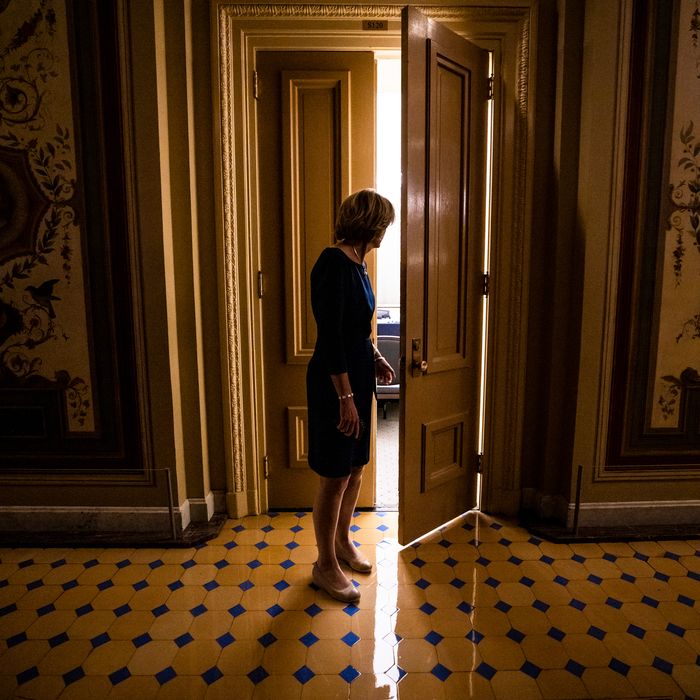
The chaos surrounding New York City’s first deployment of ranked-choice (or “instant runoff”) voting in its mayoral primary will surely lead to a reappraisal of this popular electoral innovation, which up until now has been a favorite of wonks, progressives, and cool kids. A particularly interesting (and possibly consequential) new test of RCV will occur next year in Alaska, where voters adopted it along with other election reforms by ballot initiative last year, making it the second state (after Maine) to go whole-hog in this direction.
Alaska will not use RCV in its primary, however. But it has abolished party primaries, and will instead hold an all-candidates “jungle” primary with the twist that the top-four finishers (unlike the top-two systems used in California, Louisiana, and Washington) will proceed to the general election, which will then utilize RCV.
The unusual system in place in Alaska is drawing attention for reasons other than the RCV fiasco in the Big Apple (in fairness, it’s likely incompetent election management rather than RCV is responsible for the mess). Donald Trump has made a purge of Alaska’s occasionally heretical Republican senator Lisa Murkowski his highest-profile goal in the 2022 midterms. He has a willing vehicle for his dreams of vengeance against the lawmaker who often complicated his legislative plans as president and then voted to remove him from office earlier this year. That would be former state and federal bureaucrat and MAGA devotee Kelly Tshibaka, who is racking up endorsements from Alaska conservatives long annoyed with Murkowski’s pro-choice views and independent posture. The state GOP central committee voted overwhelmingly in March to censure the incumbent for her vote to convict Trump, and to seek another candidate. Tshibaka, with her Trump backing, her reliably right-wing views, and her large telegenic family (she and her husband are both Harvard Law School grads and conservative Evangelical ministers, and have five children), seems clearly to be the consensus choice.
In a straight-on Republican primary, Murkowski would definitely be an underdog, particularly with Trump pledging to campaign personally against her. But the new system virtually guarantees her a spot in the general election, likely alongside Tshibaka, whomever Democrats decide to back (quite likely independent Al Gross, who won over 40 percent of the vote against Dan Sullivan in 2020), and perhaps a less prominent fourth candidate. And she’s won without party backing before, most famously in 2010, when she lost a GOP primary to conservative activist Joe Miller but then won a three-way general election with a rare write-in campaign.
A May 2021 poll from the Democratic firm Change Research showed Murkowski running third behind Tshibaka and Gross in a hypothetical general election. When ranked-choice preferences were calculated in the polls, the incumbent was eliminated in the semifinal round and Tshibaka edged Gross for the win.
But as New York City has shown, ranked-choice voting affects campaigns in unpredictable ways. A viciously negative Murkowski-Tshibaka competition for Republican votes could lead to supporters of each candidate denying the other second- or third-choice preferences. While Alaska remains a red state with a bad case of fossil-fuel addiction, Democrats are creeping toward viability, in part through a shrewd alliance with indies like Gross. Trump’s 2020 margin in the state was four points lower than in 2016.
Given the uncertainty of the landscape and the many wrinkles created by the new voting system, Murkowski could decide to retire (she has not yet announced her intentions) after 20 years in the Senate (a former state legislator, she was appointed to the seat by her father, Frank Murkowski, who had vacated it upon his election as governor). But she might bridle at Trump taking credit for such a step, and she has expressed a less-than-high opinion of Tshibaka’s candidacy: “It doesn’t surprise me. The president has said, you know, that he’s gonna endorse anybody that has a pulse … This, apparently, is somebody with a pulse.” She might well be able to counter an opponent with an “America First” message with her own “Alaska First” pitch, touting her shameless use of her leverage as a key centrist senator to bring home the bacon for her Washington-dependent state.
Given the new voting system, Murkowski’s strong relationship with Alaska’s sizable Native population could come into play given the fears expressed in New York about the possibility that RCV will disadvantage minority voters. In 2010, Native villages were pivotal in Murkowski’s write-in victory — a much trickier proposition than filling out a ranked-choice ballot. So she’s probably in a pretty good position to benefit from the new system if she chooses to go for a fourth full Senate term.
"choice" - Google News
July 01, 2021 at 01:25AM
https://ift.tt/3dtMiC2
Will Ranked-Choice Voting Help or Hurt Lisa Murkowski? - New York Magazine
"choice" - Google News
https://ift.tt/2WiOHpU
https://ift.tt/3c9nRHD
Bagikan Berita Ini














0 Response to "Will Ranked-Choice Voting Help or Hurt Lisa Murkowski? - New York Magazine"
Post a Comment